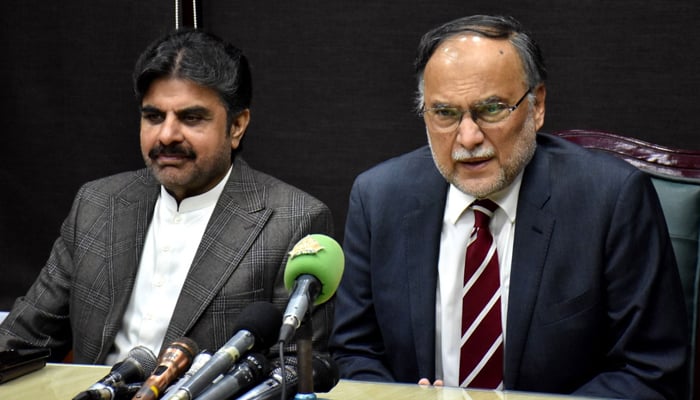
- Ahsan Iqbal says PML-N and PPP are united for the betterment of Pakistan.
- He advocates a policy of collaboration rather than confrontation.
- Iqbal hopes for an improvement in the country’s digital infrastructure.
Planning Minister Ahsan Iqbal on Monday said there were ups and downs in politics, downplaying the Pakistan People’s Party’s (PPP) warning to quit the centre’s coalition government.
A day earlier, PPP spokesperson Shazi Marri had expressed displeasure over the failure of the Pakistan Muslim League-Nawaz (PML-N) to involve her party in the decision-making process, warning that ” the federal government would collapse the day the PPP withdrew its support.”
She said that the government led by Prime Minister Shehbaz Sharif kept the PPP and the Sindh government in the dark about the establishment of the Pakistan Maritime & Sea Port Authority (PMSPA).
The PPP spokesperson also said that they have been calling for a meeting of the Council of Common Interest (CCI) to be convened for a long time, but no CCI meeting has been convened in the last 11 months.
“There is always a somewhat musical rhythm within a coalition government, just like within a family. Within a family, brothers and sisters or family members can have their disagreements.
“But that does not mean there is a serious gap. Whatever the problem, we are handling it internally in a mature manner,” the planning minister told reporters in Karachi, speaking alongside the leader of the PPP and Sindh Minister Nasir Hussain Shah.
Explaining further, the federal minister said that PML-N and PPP are the major political parties in the country with their distinct ideologies. However, he said, they are in agreement on Pakistan’s development and must stay on one page to uphold the country’s interests.
“This understanding forms the basis of the Charter of Democracy signed by Nawaz Sharif and Benazir Bhutto. It reflects the essence of democracy, where two mature political parties collaborate for the betterment of the country.”
The federal minister added that given the current circumstances, senior leaders of both parties believe that the country requires a policy of collaboration rather than confrontation.
Iqbal mentioned that Finance Minister Muhammad Aurangzeb would convene the National Finance Commission (NFC) meeting soon.
“Securing cyberspace”
The minister was also asked about the state of the country’s digital infrastructure, given the internet disruptions that have persisted since early last year.
Iqbal, who is also an engineer, said technology is a “huge opportunity” as well as a “threat”. He mentioned that cyberspace is a new frontier, just as a nation defends its borders, it must also defend its cyberspace.
“Every country strives to protect its cyberspace, because failure to do so could cripple the nation by compromising its energy, financial and insurance structures,” he said.
The minister said all countries, from Australia to the United States, are working to secure their cyberspace. Pakistan, he noted, took time to make this decision.
Iqbal said the government was providing uninterrupted VPN service to software companies, which also led to a 34% increase in software exports. “This is a temporary phase, you will see gradual improvement.”
He said Pakistan faces “hidden” challenges, for which the government must work to ensure the safety of its people. The minister mentioned that there are allegations that the US elections were hijacked via social media.
“If the United States is facing such challenges, we are far behind them,” he said.
